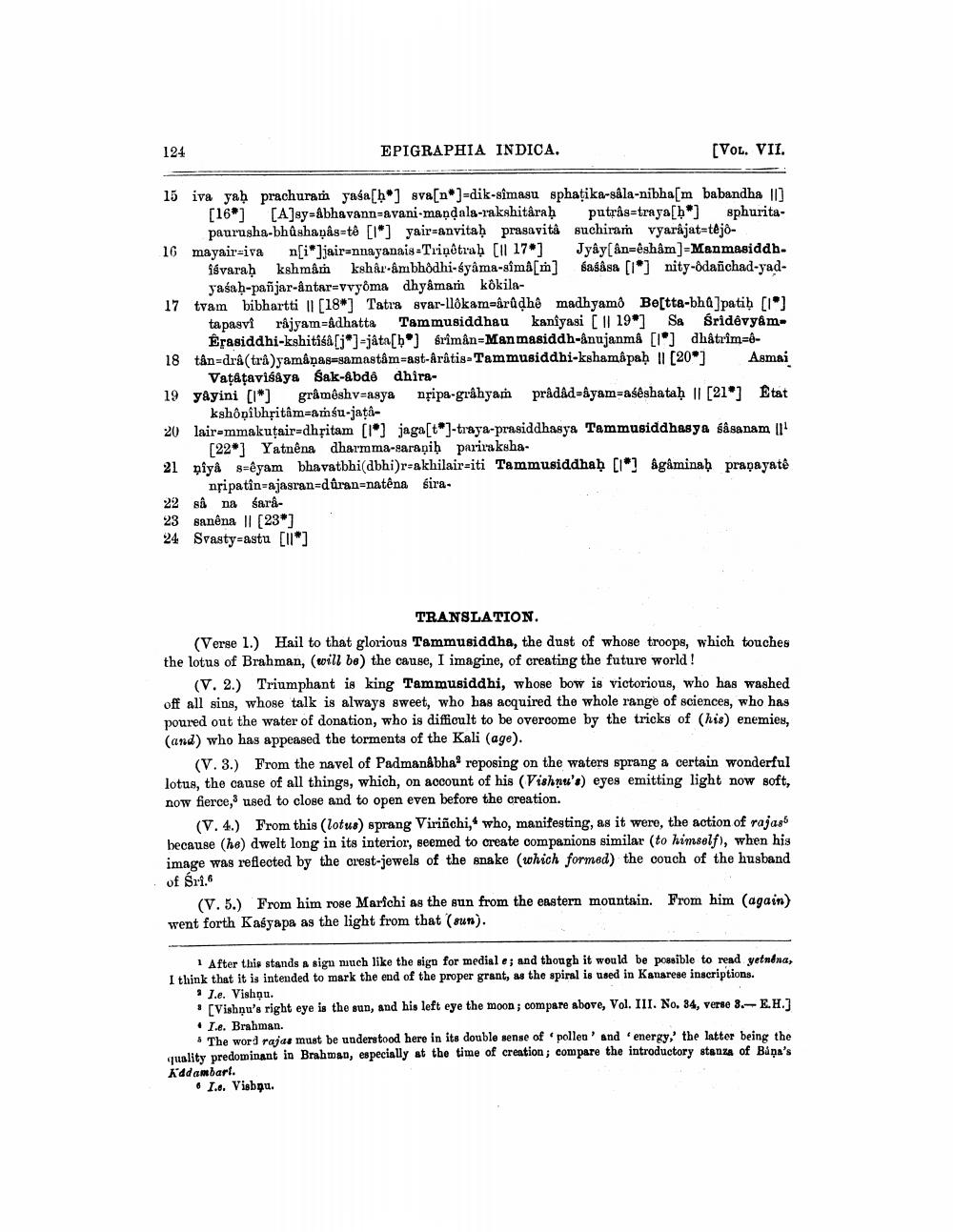________________
124
EPIGRAPHIA INDICA.
[VOL. VII.
15 iva yaḥ prachuram yasa[ho] sva[n]-dik-sîmasu sphatika-sala-nibha[m babandha ||]
[16*] [A]gy-abhavann=&vani-mandala-rakshitaraḥ putrâs-traya[b] sphurita
paurusha-bhäshapás-té [1] yair-anvitaḥ prasavita suchiram vyarajat-tējó16 mayair-iva n[i]jair=nnayanais-Triņôtrah [ll 17"] Jyây[&n=&shâm)-Manmasiddh.
isvaraḥ kshma kshår-ambhôdhi-syama-sîma[m] sasása (1) nity-8dañchad-yad
yasah-pañjar-Antar=vvyoma dhyâmar kokila17 tvam bibhartti 11 [18] Tatra svar-llókam=årûdhe madhyamd Bestta-bhQ]patih [1]
tapasvirajyam=&dhatta Tammusiddhau kaniyasi [ 11 199) Sa sridevyam
Erasiddhi-kshitisa [j*]=jậta[bo] srîmån-Manmasiddh-ánujanm& [] dhâtrim=ê18 tân-drá (tra)yamanas=samastâm=ast-ârâtis-Tammusiddhi-kshamapah II [20] Asmai
Vațâțavisaya Sak-abdô dhira19 yayini [1*) gråmôshv=asya nfipa-gråhya prad&d=ayam-aśêshataḥ || [21] Etat
kshôpibhritâm=amsu-jata20 lair-mmakuțair-dhritam (1") jaga[t*]-traya-prasiddhasya Tammusiddhasya śâsanam ||
[22] Yatnêna dharmma-saraṇiḥ pariraksha21 piyâ sêyam bhavatbhi(dbhi)r-akhilair=iti Tammusiddhaḥ [*] âgâminaḥ prapayatê
npipatîn-ajasran-dûran=natêna sira. 22 si na śara23 sanêna || [23] 24 Svasty=astu [ll*]
TRANSLATION (Verse 1.) Hail to that glorious Tammusiddha, the dust of whose troops, which touches the lotus of Brahman, (will be the cause, I imagine, of creating the future world!
(V. 2.) Triumphant is king Tammusiddhi, whose bow is victorious, who has washed off all sins, whose talk is always sweet, who has acquired the whole range of sciences, who has poured out the water of donation, who is difficult to be overcome by the tricks of (his) enemies, (and) who has appeased the torments of the Kali (age).
(V. 3.) From the navel of Padmanabha reposing on the waters sprang a certain wonderful lotus, the cause of all things, which, on account of his (Vishnu's) eyes emitting light now soft, now fierce, used to close and to open even before the creation.
(V. 4.) From this (lotus) sprang Viriñchi, who, manifesting, as it were, the action of rajas because (he) dwelt long in its interior, seemed to create companions similar (to himself), when his image was reflected by the crest-jewels of the snake (which formed) the couch of the husband of Sri.
(V.5.) From him rose Marichi as the sun from the eastern mountain. From him (again) went forth Kaśyapa as the light from that (sun).
1 After this stands a sigu much like the sign for mediale; and though it would be possible to read yetndna, I think that it is intended to mark the end of the proper grant, as the spiral is used in Kanarese inscriptions.
. 1.e. Vishgu. . [Vishọu's right eye is the sun, and his left eye the moon; compare above, Vol. III. No. 84, verse 8.-E.H.] • 1.e. Brahman.
The word rajas must be understood here in its double sense of pollen' and energy,' the latter being the quality predominant in Brahman, especially at the time of creation, compare the introductory stanza of Bina's Kadambari.
* I... Visbou.




